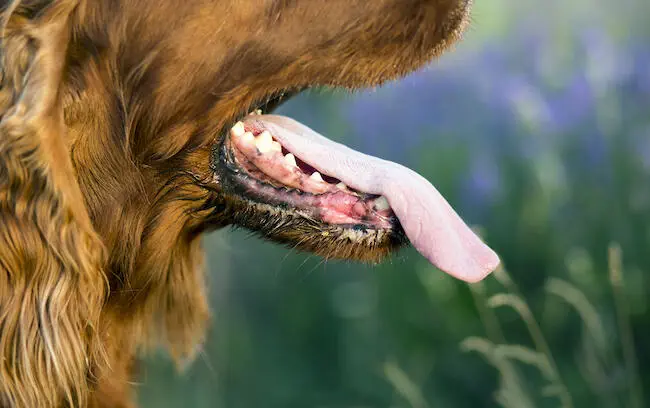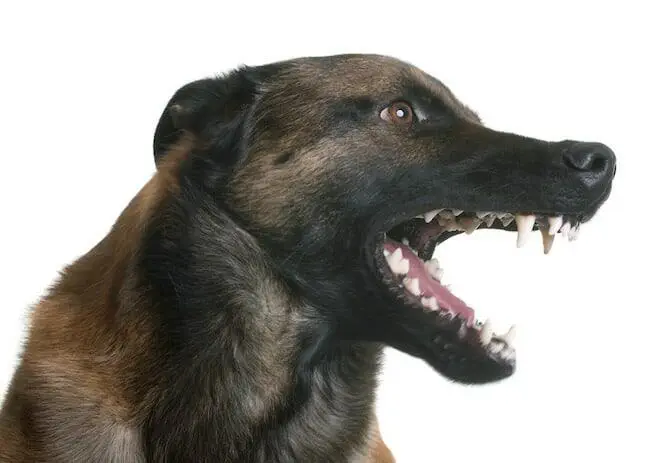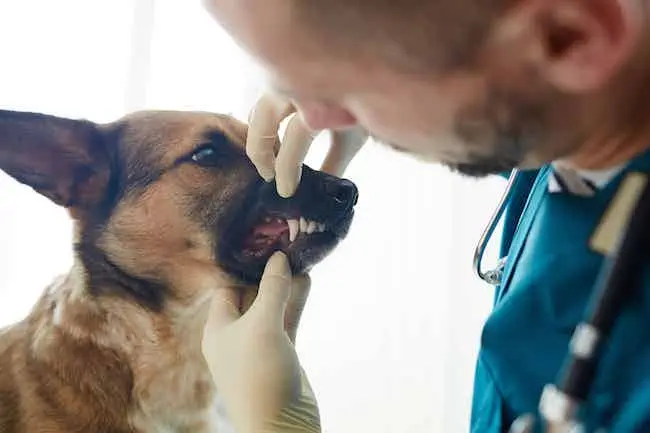A healthy, adult dog should have a set of 42 permanent teeth, which is around 10 more than the average human.
That’s a heck of a lot of gnashers for one mutt’s mouth and so just like us, dogs need regular teeth cleaning and oral care to ensure they can live a healthy and happy lifestyle.
But despite having more teeth than humans, dogs follow a very similar dental path!
As puppies, dogs grow 28 deciduous teeth, better known as baby teeth, which begin to appear just two weeks after their birth.
Then, just like human baby teeth, these little fangs begin to fall out at around 12 to 16 weeks of age, to make way for their permanent adult teeth!
And with as many as 42 in their mouths, it’s no wonder our pups have such big, beautiful smiles!

Dog teeth FAQ
As dog owners, our dog’s teeth are something we often take for granted.
Doggy dental care can often slip to the very back of our priorities when it comes to looking after our pups. So to answer your toothy queries and canine health anxieties, we’ve put together this handy Q&A, to help turn you into a certified dog dentist!
Can you tell how old a dog is by how many teeth it has?
The answer to this usually depends on how young the dog is. When still a puppy, you can easily estimate a dog’s age by examining which baby or adult teeth have erupted. Baby incisors and canines will erupt between 3-6 weeks of age and adult versions of these teeth should replace them at 12-16 weeks.
Once adults, it’s pretty difficult to determine a dog’s age through their mouth. You could try and make an estimate based on the amount of wear and tear on their gnashers, and indeed this is how a vet will estimate the age of a rescue dog. But this is obviously never going to be a particularly accurate measurement.
When will my puppy lose all its baby teeth?
A puppy should have shed almost all of its milk teeth by six months of age.

When will my dog have all its adult teeth?
By 8 months old, a dog should have all of its adult teeth.
A puppy should have lost all its baby teeth by 6 months and will have probably started growing in some of it’s more important adult teeth. At this point, all or at least most of their full set of teeth will be visibly erupting, but it can take a few more months for them to fully come through.
Can dogs regrow adult teeth?
Sometimes, dog teeth can become damaged from chewing hard items or even lost through gum disease as a result of improper dental care.
Unfortunately, a dog’s adult teeth are for life, and so if they lose one, it’s gone forever. This is exactly why you need to make sure you regularly brush them!
Can dogs get cavities?
Cavities in dogs are actually extremely rare, although they can still happen! Cavity-causing bacteria thrives by metabolizing sugar into acid, but due to dogs’ low sugar diets, it’s a bacteria rarely found in their mouths. So if your dog does get a cavity, you’re likely feeding them too many sweet treats!
Treatment for such issues is the same as in humans, and dogs will simply have their poorly teeth removed and replaced with a filling.

Signs of dental disease in dogs
Worried your pup is showing signs of periodontal (gum) disease? Well, we have a guide on how to tell. Some obvious signs are:
- Bleeding gums
- Red gums
- Plaque
- Bad breath
- Blood in their food and water bowl
- Thick saliva
- Only using one side of the mouth
- Dropping food while eating
- Swelling of the face
- Rubbing face against objects or with paws
If you notice any of these issues, contact your nearest veterinary professional for advice on how to care for dogs with periodontal disease.
How do I prevent gum disease?
The only way to stop your dog from developing any nasty tooth disease is by daily cleaning. This can be done by brushing with a specialised dog toothpaste or enzymatic toothpaste which does not require brushing.
If brushing your dog’s teeth is too difficult a task, you can get them professionally cleaned under anaesthesia by a veterinary professional. This will keep their dental hygiene in good condition and save you and your pup any stressful brushing systems.
Between brushes or vet treatments, you can also use various products to improve their dental health. You won’t have to look too hard to find a ton of dog dental items available, such as wipes, treats, chews and even powders that can be added to food!

